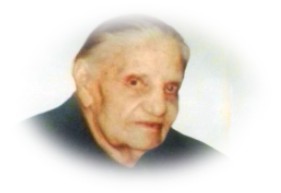Argyro (the Leper)

A German firing squad is about to execute a group of soldiers in WWII. A young woman marches across placing herself between the rifles and the soldiers, pleading for the life of her fiancé. This was Argyro. When the executioner granted her request he was surely caught off guard when she demanded that all should be released or else she would not step aside.
After the war she and her fiancé were married but the joy was short lived for after her first child she was diagnosed with the then incurable Hansen’s disease. Forced to go to Spinalonga (a leper island) away from her family, her desire to see her child grew. One night she escaped, swimming to the mainland and walking for seven days to find her family. If the physical exhaustion, hunger and thirst she faced to get there were not enough, she would soon add heartbreak, for as she arrived they told her that her child had reposed. Broken and unable to offer anything else, she took the long path back to Spinalonga, the same way she left.
She would repeat this journey five more times out of a sense or honour (“philotimo”). On one occasion it was to attend her husband’s second wedding who, seeing her condition getting worse asked if he could remarry. The other four times, to attend the baptisms of each of his children. Each time she simply left her blessing and a satchel of money she collected from her little allowance.
When Spinalonga finally closed in 1957, Argyro moved to the Leprokomeio (Hospital of Infectious Diseases) in Athens. Many had come here who, although healed, were too disfigured to return home. She spent her days praying and fasting while ministering to older patients and preparing them for burial. Here she also met St Nikiforos the Leper and Elder Evmenios Saridakis, the chapel priest.
Born in Vasilies, Crete around 1920, this courageous woman managed to turn her suffering into acts of love. Her prayer and fasting would contribute to the cure for leprosy. Argyro and some other devout women had asked God to provide the cure and they would never again taste oil. Once discovered, every Pascha thereafter, these blessed women would but dip a finger in the oil candle and touch their lips so as to honour the Resurrection without breaking their promise to God. May her memory be eternal.
Source: Lychnos June-July 2021
